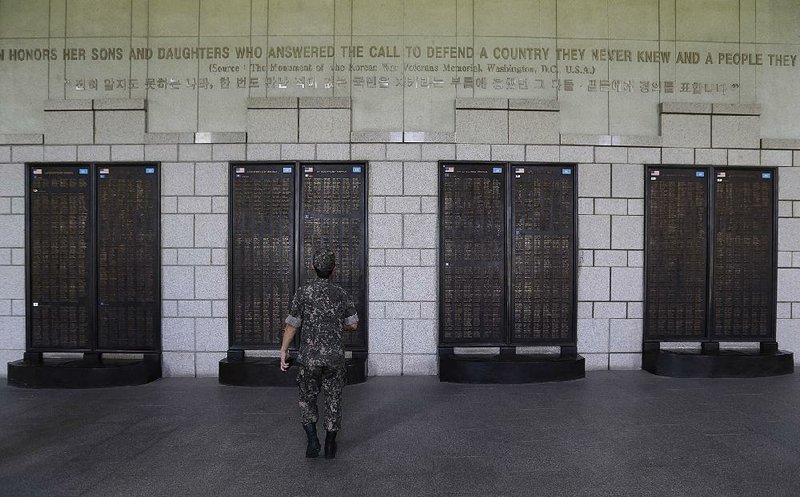WASHINGTON -- More than a month after North Korea pledged to immediately return some American war dead, the promise is unfulfilled.
Secretary of State Mike Pompeo, who traveled to Pyongyang this month to press the North Koreans further, said Wednesday that the return could begin "in the next couple of weeks." However, it could take months or years to positively identify the bones as those of specific American servicemen.
In a joint statement at their Singapore summit, President Donald Trump and North Korean leader Kim Jong Un committed to recovering the remains of prisoners of war and those missing in action decades after the Korean War -- "including the immediate repatriation of those already identified."
That was more than a month ago, on June 12. Although Trump said eight days later that the repatriation had happened, it had not. The Stars and Stripes newspaper reported from South Korea on Tuesday that the North has agreed to transfer as many as 55 sets of remains next week. The Pentagon and the State Department declined to comment on any specifics promised by the North.
"We're making progress along the border to get the return of remains, a very important issue for those families," Pompeo said Wednesday at the White House. "I think in the next couple of weeks we'll have the first remains returned, that's the commitment, so progress certainly being made there."
There is some doubt that any remains turned over would be of Americans. Trump admitted as much in a CBS News interview Saturday.
"You know, remains are complicated," he said. "Some of the remains, they don't even know if they are remains."
Richard Downes, whose father, Air Force Lt. Hal Downes, is among the Korean War missing, says hopes may have been raised too quickly.
"Yes, the Singapore statement overpromised," he said, "exacerbated by our hope that it was accurate."
Hope has long sustained Downes and thousands of other Americans who seek closure after decades of uncertainty about a relative missing from the war. The Pentagon says 7,699 U.S. servicemen are missing from Korea, including about 5,300 believed to be in the North. Downes, 70, was 3½ when his father's B-26 Invader went down on Jan. 13, 1952, northeast of Pyongyang, the North Korean capital. His family was left to wonder about his fate. Downes is now executive director of the Coalition of Families of Korean and Cold War POW/MIAs, which advocates for remains recovery.
The Singapore statement may yet prove to be an important breakthrough. Bringing its promise to fruition, however, is proving difficult.
Mark Fitzpatrick of the International Institute for Strategic Studies said in a Web essay last week, "What was supposed to be the easiest item on the United States-North Korea negotiations agenda -- the return of Korean War soldiers' remains -- is proving to be yet another sticking point."
Beyond the promised initial return of remains that the North may have been holding in storage for years, the State Department said Sunday that the two sides have agreed to restart searches for burial locations of U.S. war remains in North Korea. That effort was suspended by the U.S. in 2005. This raises another issue to be negotiated: how much the U.S. would pay the North for this access. In the past it has paid millions, saying the money was "fair and reasonable compensation" for the North's help, not payment for bones or information.
In Fitzpatrick's view, the North has dangled the promise of war remains as bait to attain political objectives such as progress toward a peace treaty to replace the armistice agreement that ended the fighting on the Korean Peninsula in July 1953. The North sees this political objective as an essential element of ending what it calls Washington's hostile policy toward the North, which in turn is linked to its willingness to give up its nuclear weapons.
Information for this article was contributed by Ken Thomas of The Associated Press.
A Section on 07/19/2018
